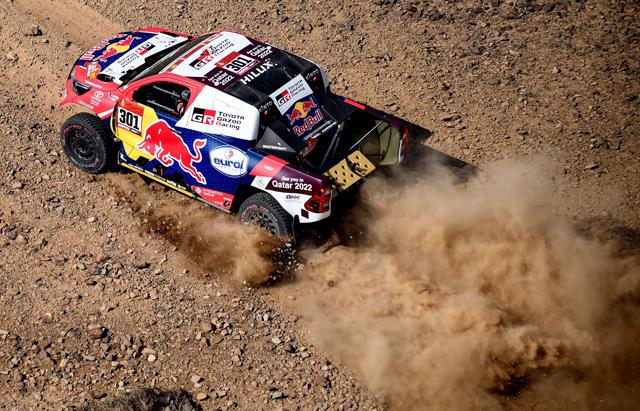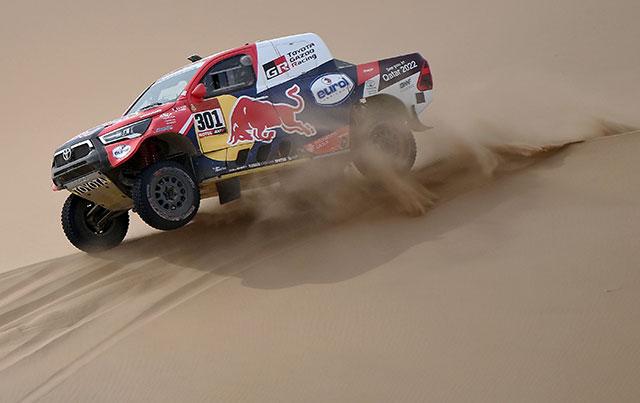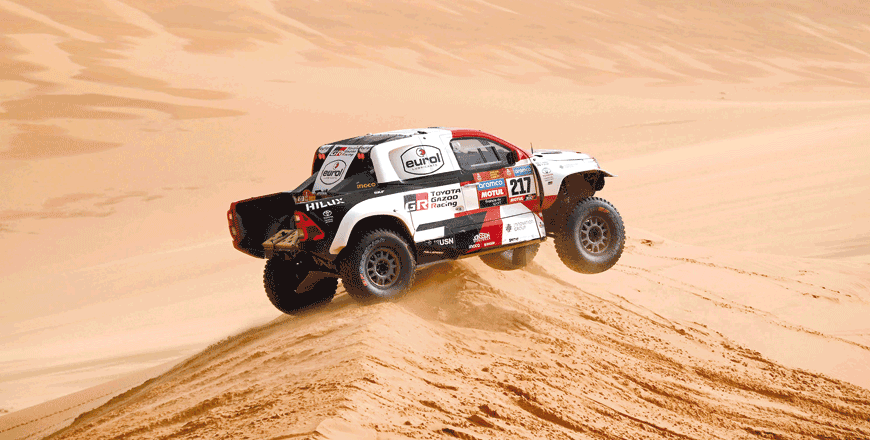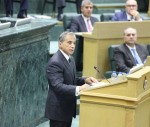You are here
Dakar Rally set for second Saudi outing
By AFP - Jan 02,2021 - Last updated at Jan 02,2021

Toyota's driver Nasser Al Attiyah of Qatar (right) and his co-driver Mathieu Baumel of France compete during the prologue near the Saudi city of Jeddah, on the eve of the 2021 Dakar Rally, on Saturday (AFP photo)
JEDDAH, Saudi Arabia — The Dakar Rally kicked off yesterday in Saudi Arabia, the second time the world's most gruelling event in motorsport's calendar has been held in the kingdom.
Launched in 1979 between Paris and the Senegalese capital Dakar, the celebrated endurance challenge moved to Saudi Arabia for the first time last year after a decade in South America.
As part of its "2030 vision" to increase its openness, the country has recently held high-profile football and boxing matches and will also hold its first Formula One Grand Prix in 2021.
Defending champion Carlos Sainz summed up the general mood of relief in being able to actually race after a season ruined by the coronavirus pandemic.
"I'm happy to be here after such a difficult year," said the Spaniard, a three-time Dakar winner.
The Dakar gets under way with Saturday's prologue ahead of 12 stages, with a rest day on January 9.
It starts and ends in the Red Sea city of Jeddah.
Qatar's Nasser Al Attiyah, like Sainz also a three-time winner (2011, 2015, 2019) said it was "very important to be here and to race".
"Our target is to win... It's my dream to win again," said the Qatari whose busy 2021 also includes targetting a seventh Olympics and going better than his skeet shooting bronze in London in 2012 with gold at the Tokyo Games postponed a year because of COVID-19.
The 43rd Dakar sees a new class joining the collection of cars, bikes, quads, trucks, buggies and SSVs — with the Dakar Classic category limited to vehicles from the 1980s and 90s.
Safety measures
The Dakar is no stranger to tragedy, with last year's rally claiming the lives of motorcyclists Paulo Goncalves and Edwin Straver.
In total, 26 participants, including 21 motorcyclists, have been killed since the inaugural rally in 1979.
A raft of new safety measures include compulsory airbag vests for motorbike riders, warnings that will notify competitors in the approach to potential dangers with designated "slow zones" limiting the speed to 90km/h in especially tricky sectors.
Defending motorbike champion Ricky Brabec became the first American to win Dakar last year, breaking KTM's 18-year winning monopoly as he streaked to victory on his Monster Energy Honda Team bike.
The 29-year-old was in confident mood after a "wild year", saying he was "comfortable" with the unforgiving Saudi desert terrain because it was so similar to his Southern California base.
"Where I live, my hometown looks more or less similar to almost everything we covered last year," he said.
"I can go as fast as we need to go and not really think about what's ahead of me because it comes natural from the training at home."
Levelling out competition are two further rule changes.
Firstly, roadbooks used to navigate each stage will be distributed 20 minutes before each daily start rather than the night before, allowing competitors much less time to map out their route.
And secondly, riders in the bike class will only be able to use six rear tyres, with tyre management usually playing a decisive role in how hard bikes can be pushed in the quest for glory.
"I'm not sure that's a good way to go about it," Brabec responded, before adding: "Strategy is definitely going to come into play. We'll see how it goes when we get to our sixth tyre."
Brabec will be up against a formidable array of previous winners in Australian Toby Price (2019, 2016), Briton Sam Sunderland (2017) and Austrian Matthias Walkner (2018)
"There's a lot more than four riders who can win the Dakar," said Brabec. "It's going to come down to the last couple of kilometres."
Price acknowledged that it was a "tough class".
"There are 10 solid dudes in there who can get the win," the Australian said.
Related Articles
YANBU, Saudi Arabia — Nasser Al Attiyah won his fifth stage on the Dakar Rally on Thursday when he finished nearly two minutes ahead of lead
AMMAN — The planet’s toughest test of motorsports endurance returns to Saudi Arabia in the New Year as a brand-new Dakar Rally route will pu
RIYADH — Qatari driver Nasser Al Attiyah’s strategy of playing it safe saw him move a step closer to retaining his Dakar Rally title and his

















